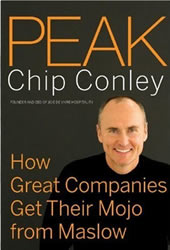(The following is a presentation I made as part of the webinar: Marketing in an Economic Meltdown)
A crisis, according Miriam-Webster’s Dictionary, is “an emotionally significant event in a person’s life”. The crisis is producing fear of the unknown for consumers and their natural response is to reduce their spending.
Because marketing is about knowing what your prospects need, first focus on the emotions behind their decision-making to better connect what you’re offering with what they’re looking for.
As a brief background, psychologist Abraham Maslow wrote the paper “A theory of human motivation”, where he presented the following hierarchy of human needs. From the bottom, they are: physiological, safety, love, esteem, and finally self-actualization.

He claimed that you couldn’t focus on higher desires unless those underneath it were satisfied. For example, if you were starving it would be hard for you to focus on your self-esteem; you’d be mostly thinking about eating. People may be interested in the higher desires, but unless the lower ones are satisfied, they’re not going to act on them.
So what does this mean for your business? Your marketing message needs to be focused on (or aligned with) safety to resonate with your prospective clients in times of financial crisis.
So here are 5 ways to resonate “safety” to turn the crisis into a marketing opportunity for your business:
1) Needs vs. Wants
First, position your offering as a need, not a want. Needs are “gotta-haves” while wants are “nice-to-haves”. In times of crisis, people are more focused on needs not wants. If you’re not already in the business of selling needs, you’ll want to highlight your offerings as a need or in conjunction with one.
The following are some of the industries that are seen as needs especially during a financial crisis:
- Debt Consolidators
- Outplacement firms
- Accountants
- Pharmaceutical companies
- Healthcare Providers
- Insurance Brokers
- Lawyers
2) Small vs. Big Luxuries
Until recently, most consumers have been used to a general feeling of economic success. During a crisis, people still desire luxuries, although big-ticket purchases will be reduced.
So, modify your marketing message to focus on the “small luxury” feeling. For example:
- If you are Restaurant owner, instead of the esteem-benefit message “Too busy to cook?”, focus on a community-benefit message such as “Relax, rejuvenate, be with friends.”
- If you own a Travel agency, instead of the self-actualization-benefit message “See the world!”, focus on a discount-benefit message such as: “See your country as never before.”
Also in times of crisis: movie rentals, alcohol, tobacco, ice cream, and local community activities are more popular small luxuries. Where possible, fusion market with these industries or offer these luxuries as desirable premiums.
3) Reframe
Your marketing message needs to target safety instead of a desire higher on the pyramid. Improve your case studies and testimonials to increase confidence in your offering, for example:
- If you own a retail Jewelry store, instead of the love-benefit message “Show how much you care”, reframe to the financial-safety message “Diamonds are a lifetime investment”.
- For Seminar providers, instead of the self-actualization-benefit message “Learn something new”, reframe to the employment-safety message “Invest in your future”.
- For Consulting firms, instead of “Outsource your work to our experts”, reframe the message to be “Reduce your overhead without risk”
4) Divide & Conquer
In times of change, smaller organizations have the benefit of flexibility. Give your separate divisions autonomy to re-approach the market with an entrepreneurial spirit. According to Inc. Magazine’s case studies, the best time to launch a startup is during a recession. One of Method’s founders (a $100M home cleaning products company) says, “starting a business in a recession is like vacationing in the off-season”. GE, HP, Microsoft, and Disney all started during a recession.
To find gold in your industry, resegment your existing client list and retarget your message to them. Be willing to highlight specific products or services in new ways and risk breaking the status quo.
5) Measure
Finally, if you’re not measuring your marketing actions and results, start today. Don’t start a marketing effort without clear metrics and a plan to regularly re-evaluate the results based on impartial data.
In summary, a crisis focuses people’s attention on safety. Creatively show your prospects how your company helps them feel safer and your business will thrive.



